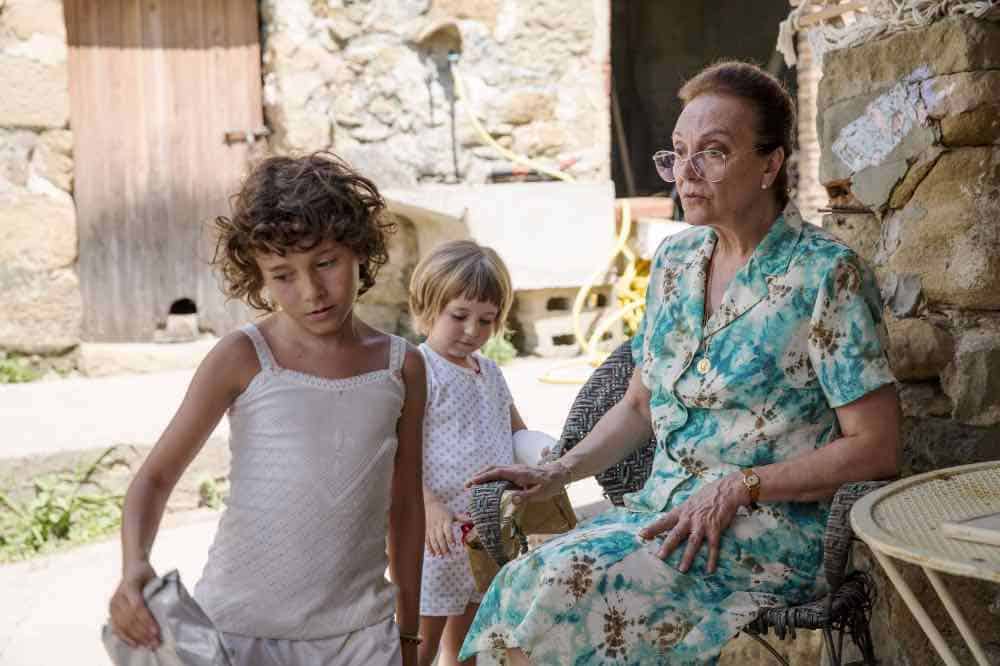Carla Simón’s outstanding debut feature, Summer 1993, chosen as Spain’s 2018 Foreign Language Oscar submission, explores the contradictory ways in which six-year-old Frida processes the deaths of her parents.

Summer 1993 begins on the back of six-year-old Frida’s (Laia Artigas) head. Around her and out of focus, a group of children run around with sparklers; she remains still. “Why aren’t you crying?” one of them asks. Frida won’t answer, and director Carla Simón doesn’t cut to her expression. Seeing Frida’s face is unnecessary: when we eventually cut to it, her blankness gives no more of a clue to how she’s feeling than the back of her head did. Just as she is unable to make sense of her own emotions, we are left in the dark, too.
Carla Simón’s debut feature, recently chosen as Spain’s submission for the 2018 Foreign Language Oscar, perceptively captures how children experience grief. Coping with the deaths of both of her parents requires a level of emotional maturity from Frida that a six-year-old is not ready for. On an intellectual level, she doesn’t understand what has happened to them ― she still expects her mother to pick up the phone when called ― but their absence is a heavy, oppressive force in her life that she struggles to process.
Frida does not understand what death means, leading her to express her grief in contradictory ways. In some moments, she simply wants to act like a carefree child. When asking to play with the local kids, she guilts them into letting her join in by telling them about her parents. She is not saddened by her loss in that moment, instead using their deaths as a tool to help her get what she wants. However, when she feels her parents’ absence, she is withdrawn, and they are all she can think about. Frida gets up in the middle of the night to place a box of matches by a statue of the Virgin Mary: “It’s a special present for my mum. She’ll love it.” At this stage, Frida still think her parents will return and that her mother will physically receive her gift. Slowly, throughout Summer 1993, she realises that this is not the case, as her attempts to contact her parents continue to be in vain.
[clickToTweet tweet=”‘Frida does not understand what death means, leading her to express her grief in contradictory ways.’ ” quote=”‘Frida does not understand what death means, leading her to express her grief in contradictory ways.’”]
Since Frida cannot comprehend how complex the emotions of those around her are, she feels isolated by her perception that her family is not experiencing the grief that weighs her down. As Frida’s extended family makes plans for her to move in with her aunt and uncle, Frida slips unnoticed into her parents’ room for the last time. Despite the recent death in the family, Frida’s relatives are enjoying themselves in a way that Frida is unable to; she is inhibited by the heartache that she believes nobody else shares. The sound of the adults singing and playing guitar are muffled through the walls. Her family seems happy and unified; Frida’s face remains emotionless. She sinks into a chair that dwarfs her in size, making her look small and insignificant in the frame ― just as she feels small and insignificant within her family unit.
[clickToTweet tweet=”‘Frida is inhibited by the heartache that she believes nobody else shares.’ – @orlamango ” quote=”‘Frida is inhibited by the heartache that she believes nobody else shares.’ – @orlamango “]
When she moves in with her aunt and uncle, Frida longs for them to give her the same amount of attention and affection that they give to their own daughter. Frida is desperate to feel secure in an unconditional parental relationship now that the death of her parents has taken that away from her. At some points, Frida feels accepted: her aunt and uncle allow her to sleep in their bed at night, and she dances with her uncle just after her cousin has done the same, making Frida feel that the two of them are of equal importance to him. Yet Frida reverts back to feeling like an outsider when her uncle snaps at her, or when her aunt ― who is also grieving the death of her sister ― stays in bed all day and ignores her.

Frida may have longed for a stronger parental relationship even before her parents were gone. When Frida dresses in her aunt’s clothes and makeup to role-play as the mother to her younger cousin, she regurgitates lines that she has clearly heard from her own mother: “I’m really tired. I need to rest sweetheart.” Frida seems to see this as the way that mothers talk to their children. Her own mother often didn’t spend as much time with her as she wanted. Simón suggests that when her parents were alive, Frida wished for more love and attention from them. After their deaths, her sense of loss is exacerbated by those missed opportunities that she will now never get back.
As a child, Frida’s natural self-focus makes her unable to see the actions of the adults around her as independently-motivated. Her mindset is too simplistic to process the world outside of how it relates to her. She fears that her parents not spending time with her was her own fault, and therefore she fears that their disappearance is also somehow her responsibility ― a reaction to her behaviour rather than due to circumstances out of their control. Sensing similar rejection from her aunt and uncle makes Frida think that they may leave her, too.
[clickToTweet tweet=”‘After losing her parents, Frida’s grief is worsened by the missed opportunities she won’t get back.’ ” quote=”‘After losing her parents, Frida’s grief is worsened by the missed opportunities she won’t get back.’”]
By running away, Frida chooses to leave before they have the chance to leave her. She packs a small bag and makes it as far as the nearest road before returning and telling her aunt and uncle: “I’ll go tomorrow. It’s too dark now.” It’s not until then that they realise how disconnected Frida feels from them. They try to let Frida know she has a place in their home. Several times in the film, we see Frida lying in bed awake at night and staring blankly at the ceiling. But after her attempt to run away, her aunt comes to check on her for the first time. Rather than leaving as Frida had feared, her aunt draws closer and lets Frida know that she is there as a source of support. Her presence finally allows Frida to close her eyes and fall asleep.
[clickToTweet tweet=”‘Frida’s mindset is too simplistic to process the world outside of how it relates to her.’ ” quote=”‘Frida’s mindset is too simplistic to process the world outside of how it relates to her.’”]
Simón directs Artigas to a subdued, unaffected performance that reveals character through physical gestures. While she rarely uses her face to express emotion, we are allowed some access to Frida’s mind by observing her movements. When she’s set her mind on doing something, she moves without hesitancy but does not rush, suggesting a removed, logical mindset. She looks down when talking to her aunt at the breakfast table, showing that some of her isolation is self-imposed. The film ends only when Frida feels secure enough in her new family unit that she can let loose physically: she jumps up and down on a bed while playing with her uncle and cousin. When she recognises the acceptance and freedom she feels in that moment she is finally able to cry ― for the first time since her parents’ death. While not ready to move on from her grief, Simón leaves us with the comforting knowledge that Frida is now able to express it to those around her, and to herself.

